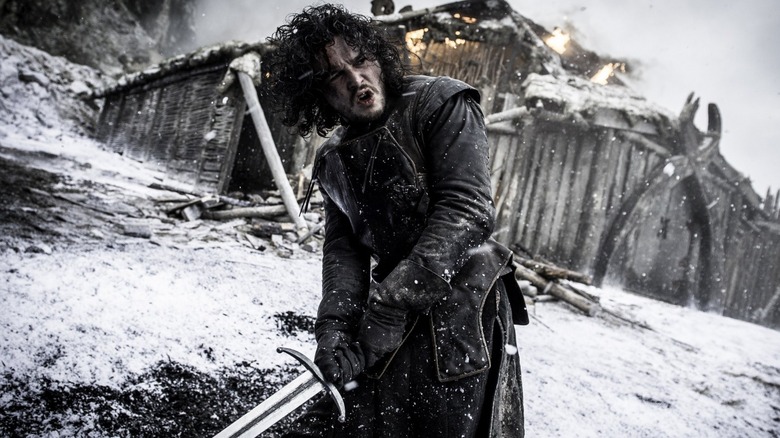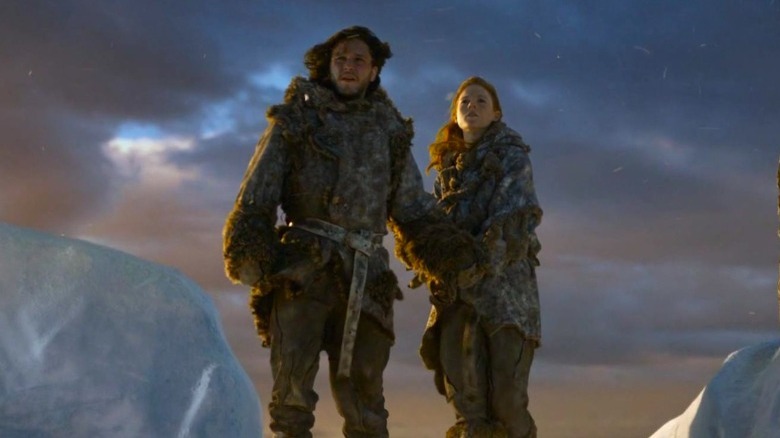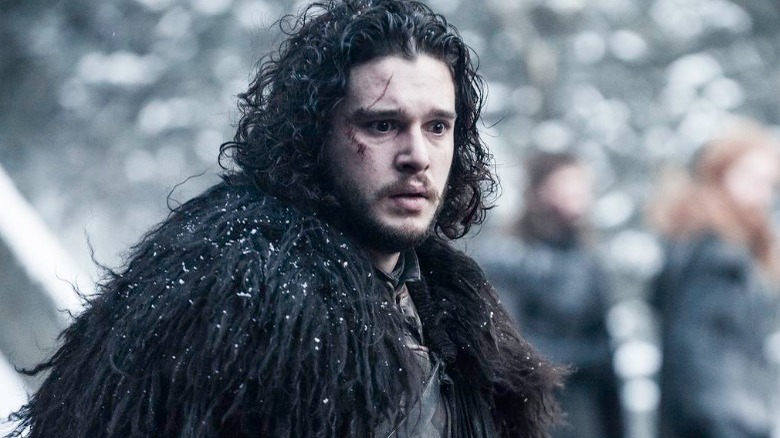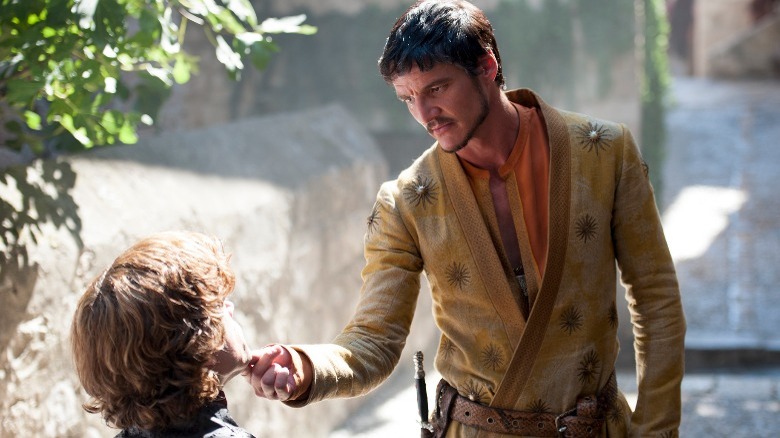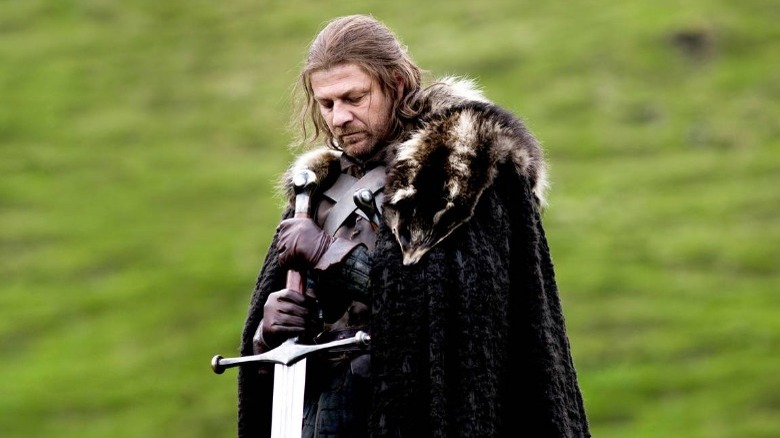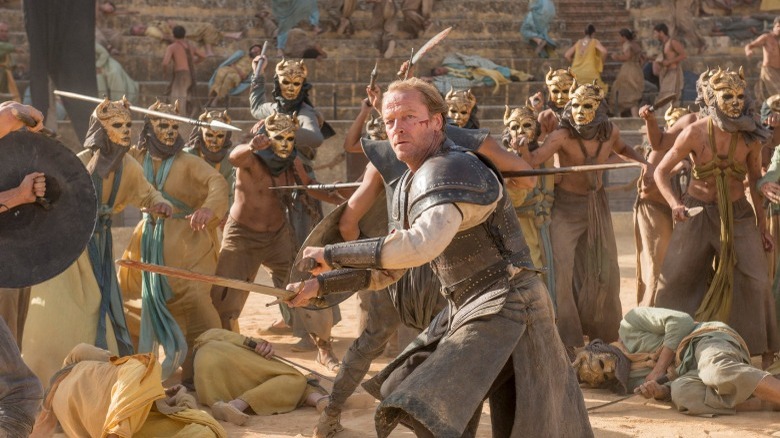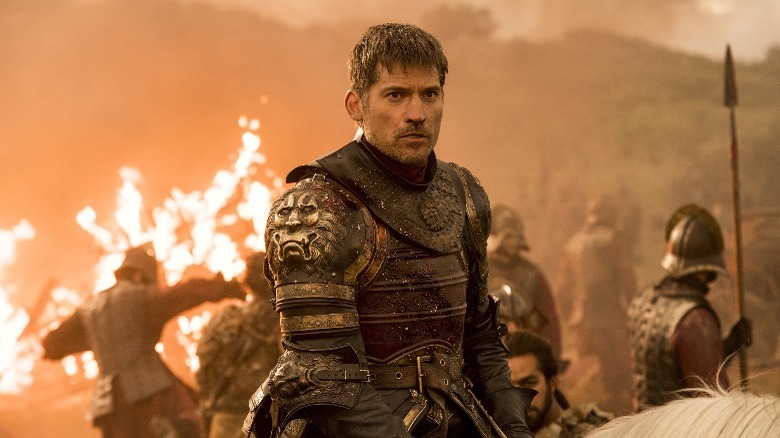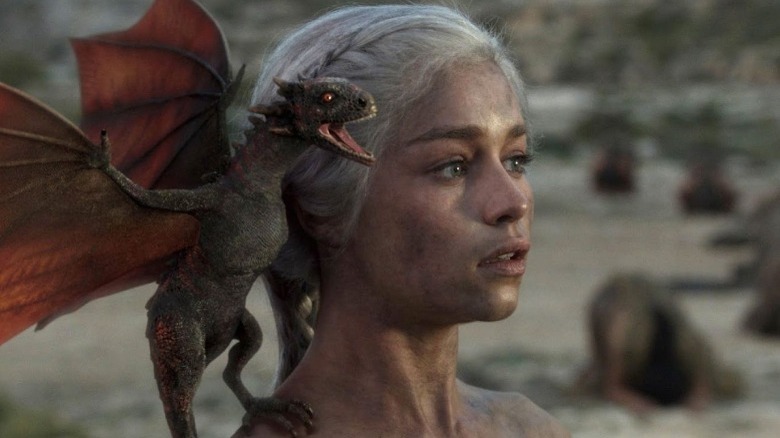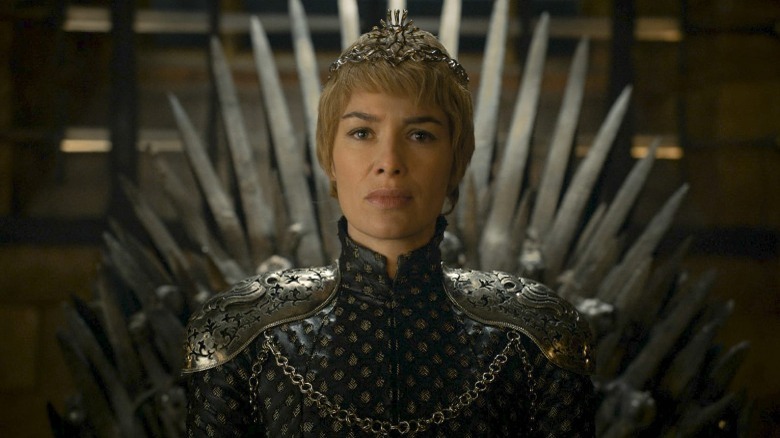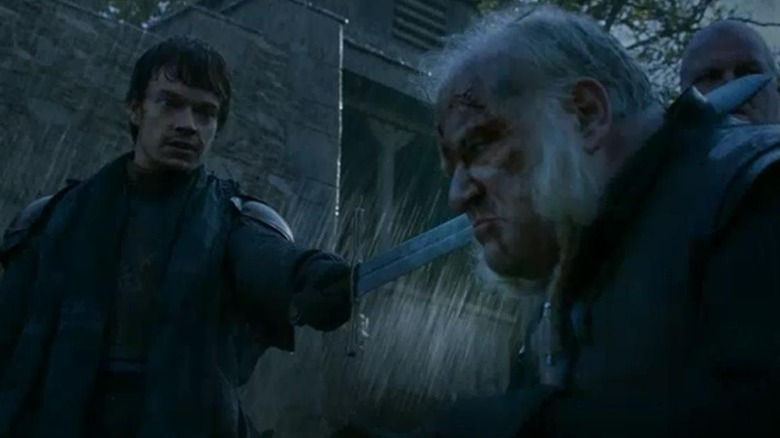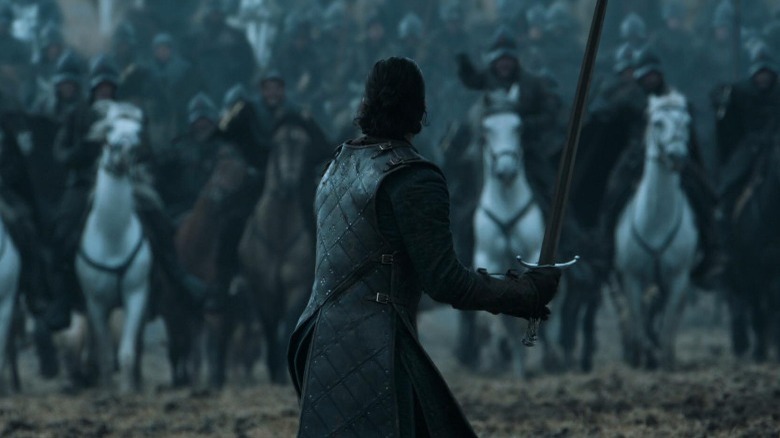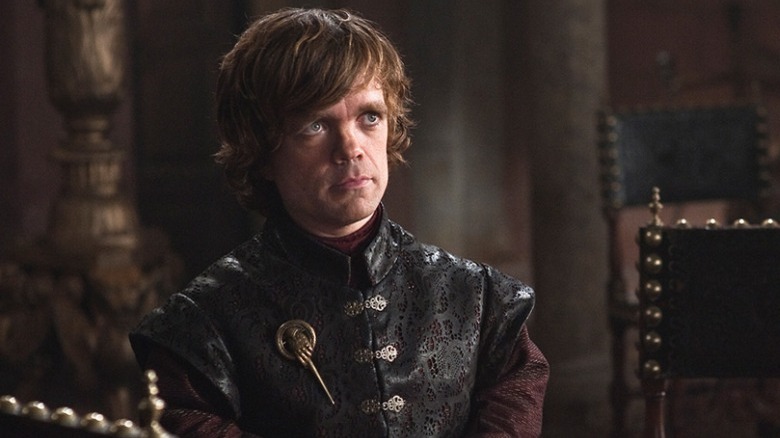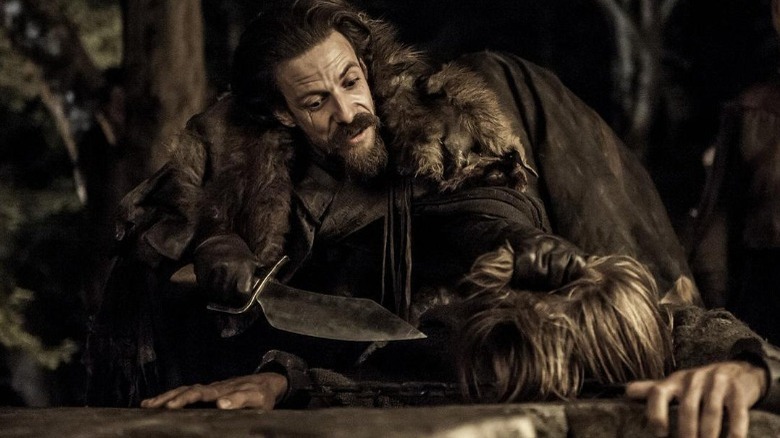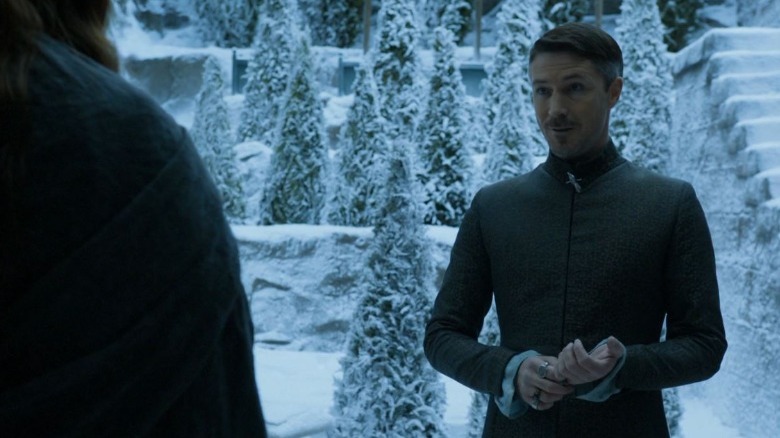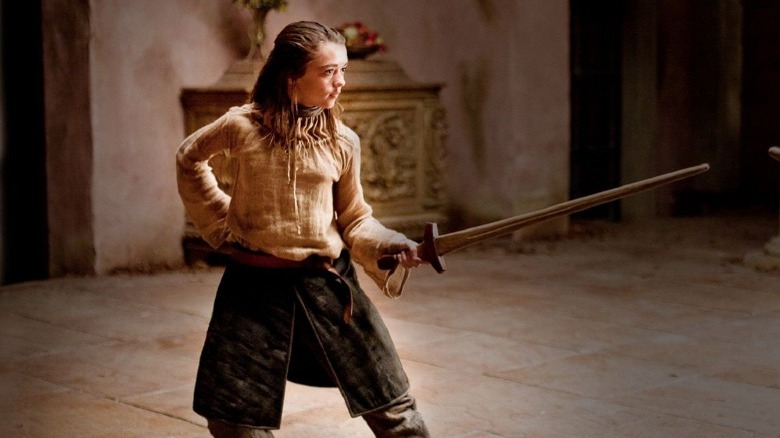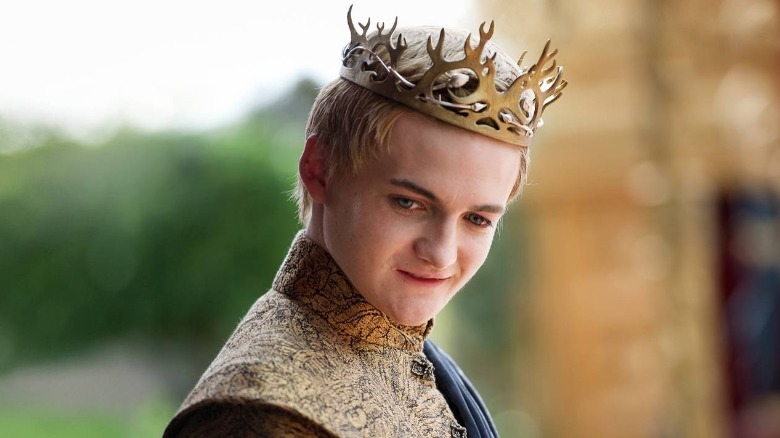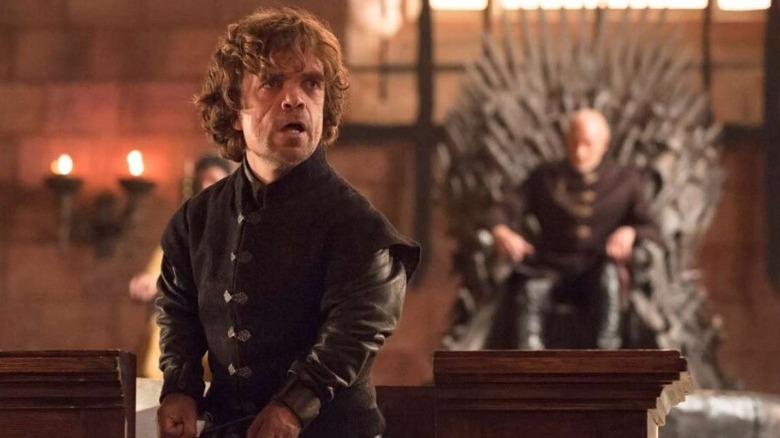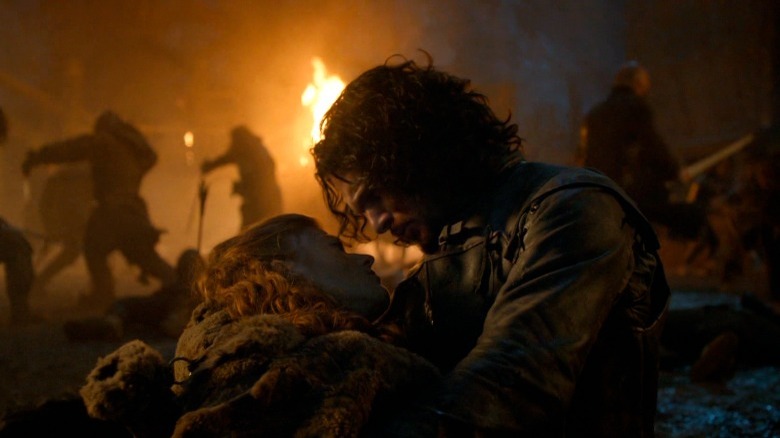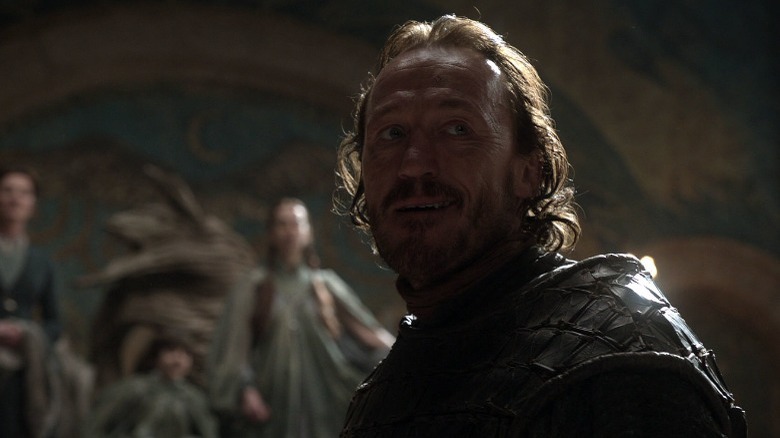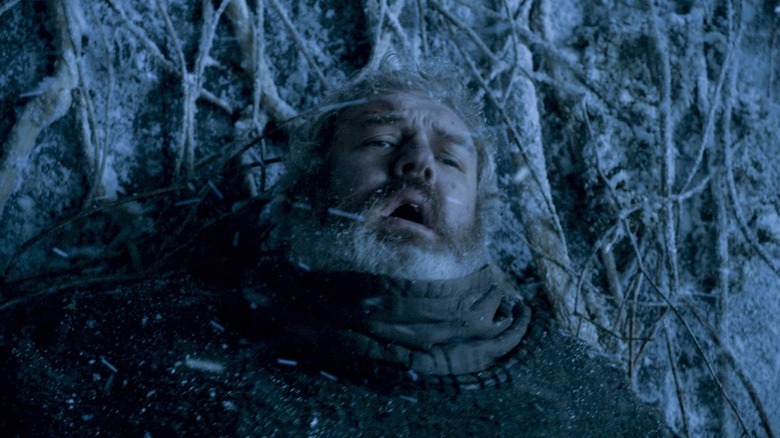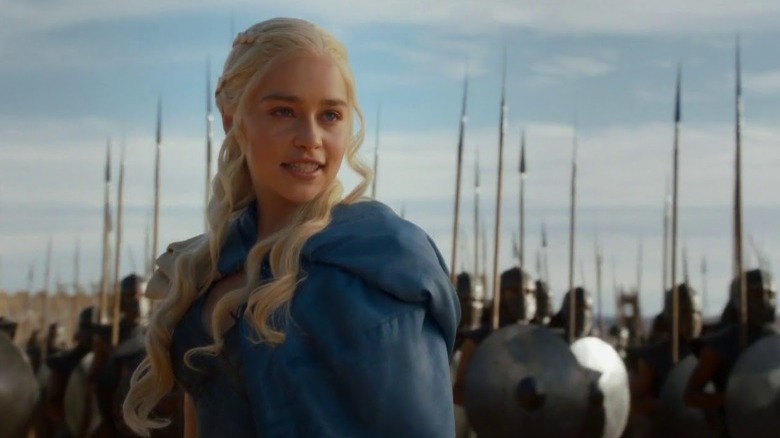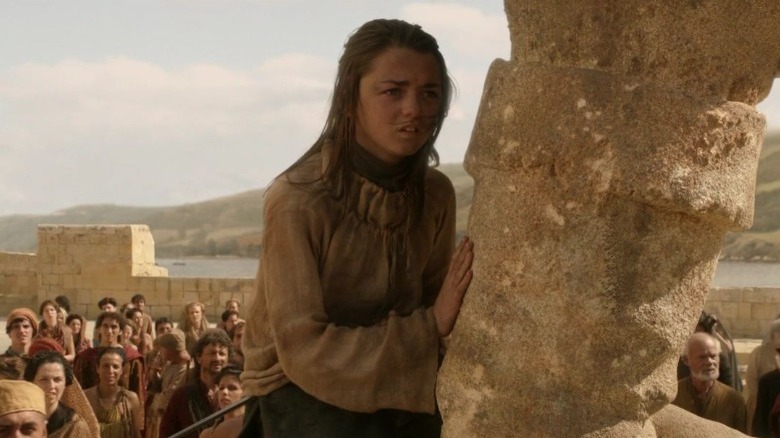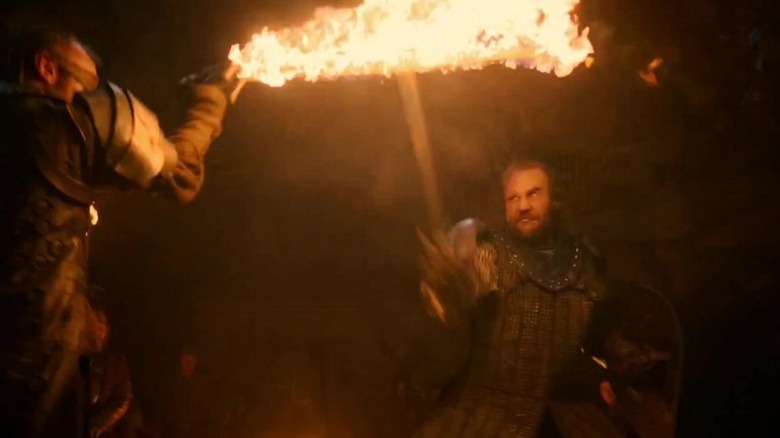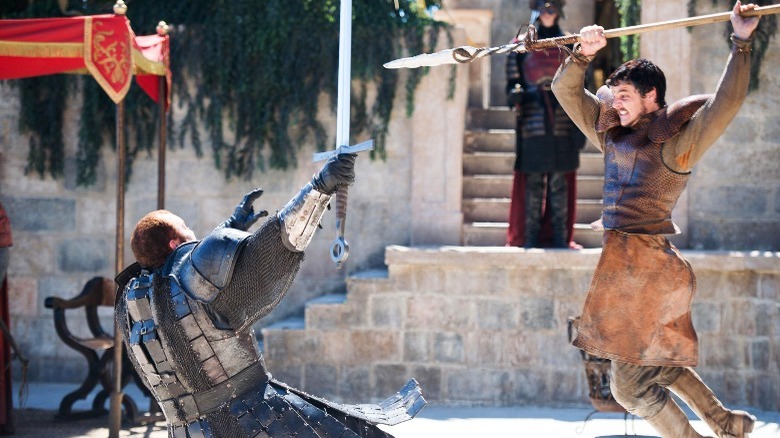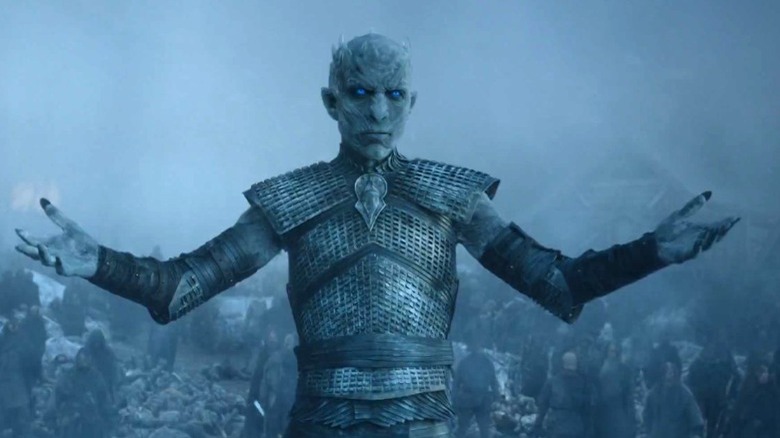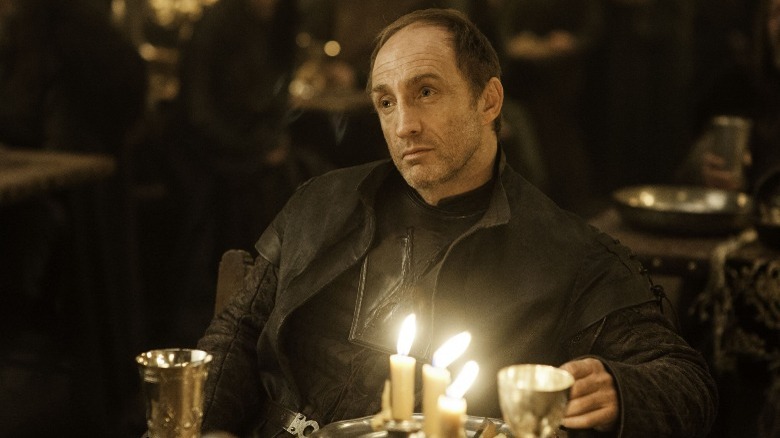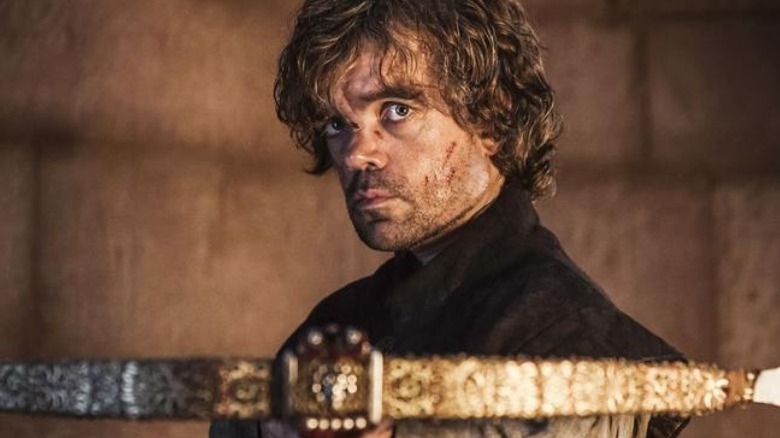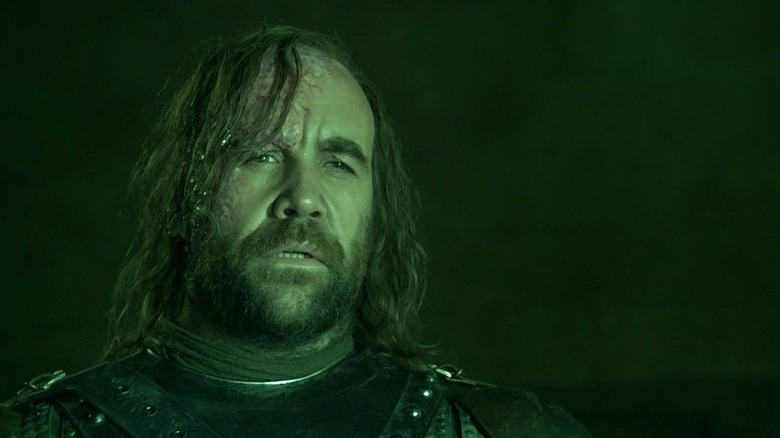The 27 Best Game Of Thrones Episodes, Ranked
"Game Of Thrones" is something of an anomaly. The cultural phenomenon had four seasons of the highest quality fantasy television, until a final season so rushed, so generic, and so poorly made, many theorized the show would disappear from cultural discourse. However, the release of the prequel series "The House Of The Dragon" brought renewed interest to the world of Westeros, leading to the original series becoming one of HBO Max's most in-demand shows.
It's tricky to rank episodes of "Game Of Thrones," as it's hard to separate great episodes from great moments. One incredible scene doesn't necessarily make it a brilliant episode in its own right. A misjudged moment can taint an entire episode. Likewise, one standout sequence can make an otherwise pedestrian episode an all-time classic.
Despite this, it remains one of the most controversial, divisive, and frequently brilliant television series ever made. Below are the 27 best episodes of the most impressively made episodes of the show's history, which only makes its latter seasons' descent into fan service all the more upsetting.
27. The Climb
One of the most fun aspects of watching "Game Of Thrones" as a book reader is seeing characters who never interacted on the page share scenes together. "The Climb" features several such scenes, including the epic battle of words between Tywin Lannister (Charles Dance) and Olenna Tyrell (Diana Rigg), trading barbed insults over the future of their respective houses.
The meeting between Melisandre (Carice van Houten) and the Brotherhood Without Banners is another creation for the show, and it's interesting to see the two different branches of the same religion essentially trading notes, as she marvels at the resurrected Beric Dondarrion (Richard Dormer).
A show as linear as "Game Of Thrones" doesn't have the luxury of time to connect multiple themes running through each episode, so when one offers itself up, as in "The Climb," we can forgive the series for indulging itself. Petyr "Littlefinger" Baelish (Aidan Gillen) brings the the episode's themes together in an ever-so-slightly on-the-nose monologue, saying "Chaos is a ladder" (these words will haunt him later) as Jon Snow (Kit Harington) and Ygritte (Rose Leslie) reach the top of the wall after a more literal (and infinitely more nail-biting) climb of their own.
26. Mother's Mercy
In many ways, "Mother's Mercy" represents crucial turning points for its characters. Cersei Lannister (Lena Headey) embarks on her now iconic walk of shame through the streets of King's Landing but ends the penance with a look of grim resolve. Theon Greyjoy (Alfie Allen) begins his long road to redemption as he and Sansa Stark (Sophie Turner) make a leap of faith from the walls of Winterfell. Arya Stark (Maisie Williams) crosses off another name from her list with a particularly nasty murder.
However, the death of the perpetually misunderstood Stannis Baratheon (Stephen Dillane) is one of the series' biggest missteps and a disservice to his strategic genius. Stannis is appropriately terse as he faces his death, but it's irritating that Brienne (Gwendoline Christie) remains so certain in her actions — as if her time with Jaime Lannister (Nikolaj Coster-Waldau) has done nothing to change her black-and-white worldview.
Despite its problems, this season finale delivers the biggest shock of the series. In a shocking betrayal, his brothers in the Night's Watch stab Jon Snow to death. The camera lingers on his lifeless body as if to say: Yes, he is dead. What a cliffhanger!
25. Two Swords
As Frank Underwood once said, "The higher up the mountain, the more treacherous the path." So it is with the Lannisters, who find themselves in control at the start of season 4 after decimating the Starks at the Red Wedding. Tywin wastes no time in consolidating his house's dominance in a beautifully symbolic scene where he melts down the Valyrian greatsword of Eddard Stark (Sean Bean) to create two smaller swords to present to his offspring. In fact, this episode reveals how tenuous Tywin's grip on his family has become, ultimately disowning Jaime.
The arrival of the hot-tempered Oberyn Martell (Pedro Pascal) signifies another thorn in Tywin's side. Martell wants to expose the Lannisters' involvement in his sister's death with a disarming manner that belies his intelligence and the danger lurking under his laid-back exterior. Additionally, the fractious partnership of Arya and The Hound (Rory McCann) becomes solidified in an iconic sequence where they destroy a tavern full of Lannister soldiers. It's also the first indicator of how the trauma inflicted on Arya has impacted her psychologically: echoing her friend's last words to the Lannister guard who killed him before dispassionately sliding Needle through his throat.
24. Winter Is Coming
The first episode of "Game Of Thrones" is admittedly clunky in places; however, its ambition is breathtaking. "Winter Is Coming" introduces an unwieldy number of characters with impressive economy and clarity. Ned Stark (Sean Bean) is a decent man who follows a strict code of honor that he instills in his children. Right away, we understand the family's dynamics — such as Arya and Sansa's fraught relationship and Jon's tenuous position in the family. However, some characters are less clear: Theon is his usual snarky self here, but it takes a few episodes to establish his role. Also evident from the start are the tensions between the Lannisters and the Starks and Ned's fraternal bond with King Robert Baratheon (Mark Addy) — dynamics that will pay off as the series continues.
The final shocking scene in "Winter Is Coming" perfectly sets the tone for the series. Jaime casually pushes Bran Stark (Isaac Hempstead Wright) from the tallest tower in Winterfell after he witnesses him and Cersei having intercourse. Accompanied by the line "The things I do for love," the ending lets us know that nobody, not even the children of our hero, is safe.
23. The Dance Of Dragons
"The Dance of Dragons" is an episode of two halves; the first half is devastating until it shifts to an (almost) celebratory finale. Shireen Baratheon (Kerry Ingram) is one of the few characters who bring out the warmth in Stannis. His agonizing decision to burn his daughter alive is one of the series' most genuinely upsetting scenes. Her screams are almost unbearable, as it serves as his character's final breaking point. He does it because he believes in Melisandre, who has never misled him. However, it becomes a devastating misstep that sees him lose his followers' (and the audience's) support.
In Meereen, Daenerys (Emilia Clarke) attends the opening of the fighting pits — only to be ambushed by the Sons Of The Harpy. The assassins emerge from the crowd eerily, and soon the arena becomes a giant deathtrap. It's supremely tense — until Drogon returns to Dany and sets the Sons Of The Harpy ablaze. After a season of struggling with the often brutalizing culture of Meereen, Dany's exit is a freeing, triumphant moment, flying on her dragon's back for the first time and leaving for an uncertain future.
22. The Spoils Of War
"The Spoils Of War" is a significant episode for several reasons. Arya's return to Winterfell and her reunion with Sansa is beautifully handled. In fact, all the surviving Stark children (and Theon) have emotional reunions. However, it's the attack on the Lannister caravan that dominates the episode.
Potentially the best-looking battle sequence of the series, we finally see what Robert was talking about when he said: "Only a fool would meet the Dothraki in an open field." The sight of Dany's bloodriders bearing down on the Lannister army is breathtaking. But then Drogon appears, decimating the Lannister soldiers with fireballs.
Wonderfully constructed, director Matt Shakman evokes frenetic battle scenes with crystal clarity, reminiscent of the chaotic opening of "Saving Private Ryan." The episode also delivers some neat character development for Jaime and Bronn (Jerome Flynn). Jaime attempts to end the war by killing Dany and Drogon in one vainglorious charge, but Bronn saves him. He abandons his newfound riches to save Jaime in a believable heel turn that was (sadly) quickly dropped in the following season.
21. Fire And Blood
"Fire And Blood" demonstrates the show's unconventional narrative perhaps better than any other season 1 episode, ending on a muted, bleak note. First, we see the mighty Khal Drogo (Jason Momoa), felled not in battle but smothered out of mercy, having been rendered catatonic by an infected wound. What's especially dispiriting is how Drogo's death is due to the naivety of Danaerys, who places trust in the wrong people. She acknowledges this before burning Drogo on a Pyre and walking into the flames with her dragon's eggs — seemingly to her death.
Meanwhile, news of Ned's death spreads through Westeros. Maester Luwin's (Donald Sumpter) haunted look of realization as he reads the raven's scroll and looks up to Bran is one of those low-key images that linger in fans' memories. Robb (Richard Madden) and Catelyn Stark's (Michelle Fairley) visceral reactions are equally moving. In King's Landing, Joffrey Baratheon (Jack Gleeson) begins his torture of Sansa in earnest, showing her Ned's head on a pike.
But "Fire And Blood" doesn't end on a downer note: By its end, we see the first indicator that magic is alive in Westeros, as Dany emerges from flames with three tiny dragons.
20. The Winds Of Winter
The season 5 finale, "The Winds of Winter", remains as ambitious and exhilarating as any cliffhanger the series would produce. In a beautifully constructed sequence that emulates the operatic climax of "The Godfather," Cersei eliminates all her enemies in one fell swoop. Qyburn's (Anton Lesser) mournful murder of Grand Maester Pycelle (Julian Glover) is particularly memorable, as is the dawning realization on the faces of Margaery Tyrell (Natalie Dormer) and the High Sparrow (Jonathan Pryce). However, it's an underwhelming fate for Margaery, one of the standout characters of the series.
Elsewhere, there are some beautifully realized scenes — such as Davos Seaworth (Liam Cunningham) confronting Melisandre over the death of Shireen Baratheon, and Arya avenging Robb's death by murdering Walder Frey (David Bradley) in a sly nod to "The Rat Cook."
The main issue lies with how Cersei takes the Iron Throne. She essentially hits the nuclear button and never faces any repercussions. Of course, you can go around blowing people up to get what you want, but there are always consequences for this — just as she told Joffrey in season 1.
19. The Old Gods & The New
"The Old Gods & The New" episode earns a spot on our list for the sheer amount of plot progression and next-level character development on display. Theon's reluctant descent into villainy begins as he captures Winterfell, and executes the ever-loyal Rodrik Cassel (Ron Donachie). The riot at King's Landing again demonstrates Joffrey's incompetence, and he receives a satisfying slap from Tyrion.
Meanwhile, Tywin's delightful repartee with Arya continues, with the added crinkle of Arya trying to conceal her identity from Littlefinger. While it's left ambiguous whether he recognizes Arya or not, it's a tense sequence. Jon also meets Ygritte for the first time, kicking off the purest "Game of Thrones" love story, as both parties are on opposing sides of an ultimately futile war. Although the constant refrain of "You know nothing Jon Snow" becomes grating, their chemistry is evident from their first scene together.
18. Battle Of The B*******
This ranking might seem like a low placing for an episode widely considered one of the show's best. However, this episode has earned its reputation from its execution rather than its story. Logistical narrative beats in this episode don't hold up to scrutiny. The character work here pales to other episodes in the overall run of "Game of Thrones." Still, it's an unsurpassed exercise in delivering pure spectacle.
By placing the audience in the heart of the action, it might be the most realistically horrifying depiction of a Medieval battle shown on the small screen. While its "wall of bodies" is ridiculous, its sense of movement is claustrophobic — especially as the Bolton forces trap Jon's men in an ever-constricting ring of spears and pikes. The suffocating sense of the soldiers trying to break free creates genuinely uncomfortable moments to watch. Jon struggling to breathe amidst a writhing mass of bodies is a now-iconic "Game of Thrones" image.
However nasty the battle is, the death of Ramsay Bolton (Iwan Rheon) is one of the most cathartic of the series. After torturing so many characters, it's endlessly satisfying to see Sansa's abuser finally get his comeuppance.
17. What Is Dead May Never Die
Not all the best episodes of "Game of Thrones" are showy battle sequences. Some consist of quietly effective character moments like "What Is Dead May Never Die," an episode where we see Tyrion Lannister reveling in his new role as Hand Of The King. He is immediately more adept at playing the game than his predecessor, as demonstrated when he constructs a ruse to sniff out Cersei's informer. It's a neat bit of cunning that earns him the enmity of Littlefinger. He also gains the respect of Varys (Conleth Hill), who asks Tyrion the iconic riddle of where power resides, leading to Tyrion's endlessly quotable line: "It's a trick. A shadow on the wall. And a very small man can cast a very large shadow."
We also see the internal conflict of Theon, who makes the decision to betray his adopted family. But he then discovers his real family doesn't like him all that much. His burning of Robb's letter is a beautifully symbolic moment, setting him on his path of treachery. To its credit, the episode does a brilliant job of establishing that Theon has put himself in a lose-lose situation.
16. Walk Of Punishment
Jaime Lannister is one of the show's most interesting characters, constantly telling anyone who listens that he doesn't care what people think of him but bristling whenever someone calls him "Kingslayer." His mutilation at the end of "Walk Of Punishment" is the cruelest indignity for his character. Sword-fighting is Jaime's entire identity, and this is irrevocably taken away from him in one fell swoop.
What makes this episode stand out is how after this tragic moment, the rest of "Walk Of Punishment" is fairly lighthearted focusing on the farcical game of musical chairs on the small council, the sexual prowess of the mild-mannered Podrick Payne (Daniel), and a surprisingly touching farewell between Arya and Hot Pie (Ben Hawkey).
But it's the episode's final image that stays with you: as Jaime howls in anguish at the stump where his hand used to be, the episode fades to black. It's a horrific moment, leading into the most effective needle drops of the series. As The Holdsteady's version of "The Bear And The Maiden Fair" plays, it's a jarring and blackly comic way to punctuate the final scene's sick irony.
15. Mockingbird
Another episode that earns its place on this list due to its incredible scenes is "Mockingbird." This episode is also where the Machiavellian Petyr Baelish (Aidan Gillen) shows his hand — or at least part of his plan. We've always known he's untrustworthy, but this episode is where he reveals his ruthless nature. It confirms his role in the death of Jon Arryn (John Standing) and committing his most cold-blooded act — pushing Lysa Arryn (Kate Dickie) through the Moon Door.
Throughout this episode, Arya and The Hound's partnership increasingly resembles a buddy comedy. The Hound's almost childish recollection of how his brother disfigured him as a boy only endears him more to the audience.
Meanwhile, Oberyn Martell visiting Tyrion's cell is one of the most strangely moving scenes of the series. Oberyn's recollection of the first time he saw Tyrion demonstrates Cersei's lifetime of loathing for her brother, and the Dornish prince's pragmatic nature. It's one of the best monologues in a show that is renowned for its memorable speeches. The episode ends with Oberyn assuming his place as Tyrion's champion, revenging his sister against Tywin Lannister and Gregor Clegane (Hafþór Júlíus Björnsson).
14. The Pointy End
"The Pointy End" is one of the most dynamic episodes of "Game of Thrones" earlier seasons. Hitting the ground running after Ned's failed coup, the episode also sees its central characters move into the roles they will (more or less) inhabit for the rest of the series.
We get the first suggestion of Daenerys' ultimate aim to free all the slaves across the Narrow Sea. This episode is the one time we get to see the indomitable Khal Drogo in action, killing a mutinous bloodrider with his own arakh. Robb solidifies his position as commander of the Northern forces, and Jon unwittingly sets down the path that will end in him leading the war against the undead. Jon saving Lord Commander Mormont feels like a sequence that could easily have been lifted from a horror film.
The final stand of Syrio Forel is also one of the most epic showdowns in the series. Taking on the Lannister guards armed with a wooden sword, Syrio takes down five soldiers before his sword is broken, leaving his ultimate fate ambiguous. However, he saves Arya's life in the process.
13. The Lion And The Rose
Joffrey Baratheon is one of the most detestable characters in pop culture. He is a villain we love to hate, so it's only fitting that George R.R. Martin was at the reins for his final episode. The wedding of Joffrey to Margaery Tyrell is as full of foreshadowing as any whodunit. Joffrey is at his most abhorrent in "The Lion And The Rose," gleefully humiliating his uncle, tormenting Sansa, and mocking his new in-laws.
Throughout the episode, the king's death is subtly telegraphed to make Tyrion the likely suspect. While it should be macabrely satisfying to see the demise of a monstrous character, this is "Game Of Thrones," so it's complicated. His mother's wail of anguish at Joffrey's death is heartrendingly visceral (brilliantly portrayed by Lena Headey) and puts us in the uncomfortable position of sympathizing with Cersei. At least until the dying Joffrey points to Tyrion, and Cersei immediately accuses her brother of murder, something he will have a tough time disproving.
12. The Laws Of Gods And Men
The trial of Tyrion Lannister is Peter Dinklage's high point in the series. As Lannister sycophants are called to the witness stand to tear Tyrion's character to shreds, he reacts with characteristically sardonic quips until Shae (Sibel Kekilli) takes the stand. The minute she begins her damning testimony, his whole demeanor changes. His final speech is electrifying and chilling. Tyrion is justified in his righteous anger and terrifying as he mutters: "I should have let Stannis kill you all." For that brief moment, he becomes the monster everyone already sees him as. He pours vitriol on his accusers and the King's Landing populace, even getting in one last dig at Joffrey before demanding a trial by combat.
Tyrion and his father's relationship was always one of the series' most compelling dynamics. Tywin loathes his son, and Tyrion resents his father while still feeling desperate for his acknowledgment. The look of defiance Tyrion gives at the end of his speech, Tywin's barely suppressed fury, and the instrumental version of "The Rains Of Castermere" makes for one of the most rousing endings in the series.
11. The Watchers On The Wall
It seems horror director Neil Marshall was the secret weapon in "Game Of Thrones," stepping in each time the showrunners needed an episode that achieves an epic spectacle. "The Watchers On The Wall" is often dismissed in favor of "Blackwater" and "Hardhome," but it still has its fair share of iconic scenes. Plus, we get more depth to characters we haven't spent that much time with until now.
The snarling Alliser Thorne (Owen Teale) in particular is given more layers than he previously received. It would be easy to make the villainous character ineffective or cowardly, but here he's shown to be a natural leader. His candid conversation with Jon Snow on the subject of leadership, his rousing speech to the defenders of Castle Black, and that brief but blistering sword fight with Tormund Giantsbane (Kristofer Hivju) all serve to make him one of the most compelling characters of the series.
There are great moments throughout the episode, including Grenn's rousing final stand against a giant (Mark Stanley) and the death of Ygritte. Both Kit Harrington and Rose Leslie sell the hell out of their farewell, and it's an incredibly touching moment.
10. A Golden Crown
"A Golden Crown" is a stellar episode that illustrates why you should never underestimate Tyrion Lannister. After being wrongfully imprisoned, Tyrion adroitly turns the tables on his captors by demanding a trial by combat. The charismatic sell-sword Bronn quickly became a fan favorite after this episode. The duel is a season highlight, demonstrating Bronn's resourcefulness and mercurial outlook, and is an early indicator of the show's unconventional brand of fight scenes.
The episode also includes the somewhat inevitable demise of Viserys Targaryen (Harry Lloyd), who gets his promised Golden Crown. It's the first major character death of the series. Of course, it occurs due to his arrogance. But it's telling that Dany only washes her hands of her brother once he threatens her unborn child. Her detached reaction seems more like conflict than a precursor to her actions in the final season. Yes, her main tormentor is dead; but he was also her brother. It's the first example of a George R.R. Martin truism coming to light — no character is "wholly good or wholly evil." In Viserys' final moments, it's hard not to pity him.
9. The Door
"The Door" is proof the "Game of Thrones" writers were capable of genuine pathos in later seasons — even as they ran out of source material. Hodor's (Kristian Nairn) death and the revelatory nature of his final scene give the show one of its most heartbreaking moments. For six seasons, Hodor has been little more than a vaguely poignant joke character, content to speak one word since a mysterious incident as a child. In this episode, we see the origin of his nickname. The past and present bleed together in his final moments.
For one of the show's few innocent characters, it's a harrowing fate. It's even more complicated by the fact that Bran is controlling Hodor in his dying moments, compelling him to sacrifice himself. Hodor may or may not have done this any way to save his friends, but Bran rids Hodor of his agency. This is the first inkling that Bran has lost his moral compass, as he's now responsible for Hodor's death twice.
8. And Now His Watch Is Ended
There are certain things that books do better than television shows and vice versa. In season 3 of "Game Of Thrones," we see that Barristan Selmy (Ian McElhinney) has switched sides to serve Daenerys, which is revealed earlier than in the books because it's much easier to preserve a secret identity on the page than onscreen.
In the books, we already know that Dany speaks High Valyrian fluently. When this is revealed in "And Now His Watch Is Ended," this comes as a complete surprise. It's an effective reveal, as she commands the Unsullied to kill the masters. Dany orders Drogon to burn the slaver alive and it's the most satisfying "Dracarys" of the series. Emilia Clarke delivers this language better than anyone. Her speech here still gives us goosebumps. This episode shows Dany taking control and embodying her Targaryen name, emerging as a commanding leader.
On top of this, Varys tells Tyrion how he was cut in a morbid backstory. The mutiny of the Night's Watch gives us one of the darker moments of the season, with the death of Commander Mormont (James Cosmo) removing yet another figure of stability from the show.
7. Baelor
"Baelor" depicts the rarest of things for an adaptation — an episode that subtly improves its source material. The execution of Ned Stark in the books happens entirely off-page and is a humiliating end for one of the few honorable characters in the book series. However, the show grants him one final act of heroism. He mutters "Baelor" to Yoren (Francis Magee), prompting the Night's Watch recruiter to rescue Arya. He might have one of the saddest fates in the series, but there's some consolation in the way he protects his family to the end. In his final moments, he sees that his daughter is safe.
While it's mainly remembered for Ned's death, "Baelor" is absolutely packed with classic moments like Tyrion relating the story of his first love, the demonstration of Robb's prowess as a battle commander, and Jorah Mormont's badass fight against one of Drogo's bloodriders — a witty callback to the knight's earlier speech on the advantages of armor and a broadsword over the Dothraki's leather and arakh.
However, it's Ned's execution that inevitably sticks in the memory. Killing off season 1's main character gave "Game Of Thrones" its reputation as an uncompromising and realistic series.
6. Kissed By Fire
"Kissed By Fire" is a perfect example of what the show does best — deliver a series of excellent character moments and an incredible fight scene. Robb doles out justice against the mutinous Karstarks, and Jon and Ygritte consummate their doomed romance. But best of all is the scene between Brienne and Jaime in the baths at Harrenhal. Jaime's explanation of his genuinely altruistic motives for killing the Mad King shows the character at his most vulnerable. His cry of "Jaime... my name is Jaime" is the most honest and sympathetic he's ever been.
The Hound's trial by combat against the undead Beric Dondarrion is one of the most underrated and frenetically choreographed fight scenes of the series. Dondarrion's flaming sword puts the fire-fearing Hound en guarde. Arya's plaintive cries join the brotherhood's chant of "Kill him!" — making the fight even more gripping. Dondarrion's immediate resurrection is a creepy development, and it's amazing how each group in the series has a distinct aesthetic. The Brotherhood, ostensibly a force for good, has a wonderfully Gothic feel to them.
5. The Mountain And The Viper
If there's one scene that sums up the bleak realism of "Game Of Thrones" perfectly, it's the duel between Oberyn Martell and Gregor Clegane. At the start of the battle, Martell is at a height disadvantage against The Mountain, a giant of a man. His winning odds don't improve when he selects a spear as his weapon. The only reason we even think he has a chance is due to his self-assuredness and Pascal's irrepressible performance. The build-up is brilliant, and Pascal's delivery of the dialogue evolves from cocksure bravado to an impassioned refrain against the man who butchered his sister and her children. He toys with Clegane, spinning around the arena. He is in full control of the fight until one fatal misstep. The Mountain grabs him and crushes the Viper's head with a sickening crunch.
The fight alone would place this episode high on our list, but there are strong scenes throughout this episode. Sansa finally learns how to lie convincingly. Arya has an ever-so-slightly unhinged reaction to the news of her aunt's death. Jorah is banished from Daenerys' side, breaking up the longest-lasting pairing of the show.
4. Hardhome
"Hardhome" is a stealthy classic "Game of Thrones" episode with a jaw-dropping and game-changer ending. Jon and Tormund travel to Hardhome to convince the Wildlings to shelter at The Wall and join the fight against the White Walkers. The peace talks go well until a billowing of snow signifies the arrival of the army of the dead. It's a beautifully crafted sequence, building a sense of dread — especially as the screams begin in the distance and the Wildlings stampede towards the encampment. Soon the screaming becomes replaced with an eerie silence. Then the wights burst out of the mist and swarm the walls, killing all in their path.
A highlight of this episode is the characterization of Karsi (Birgitte Hjort Sørensen), who gets more depth in one appearance than many of the series' recurring characters. She is a determined character who loves her children. Her death is disturbing, murdered by the re-animated corpses of Wildling children. All of this leads to that amazing moment where the Night King raises the dead back to life. As the survivors drift away in silence, all we are left with is the disquieting image of the White Walkers watching.
3. The Rains Of Castamere
The Red Wedding is the most infamous moment in the entirety of the series. What's most surprising is how expertly the writers misdirect the audience. It really seems like Robb has the Lannisters on the ropes, and the wedding of his uncle is a brief bit of respite before the wars to come. But Robb's slight towards the Freys was always going to have serious consequences. The sense of unease builds slowly, as the prophetic title song begins and the doors are bolted in an incredibly ominous shot. Robb's new bride is stabbed repeatedly and the entire Stark host is massacred in the hall. Roose Bolton (Michael McElhatton) runs Robb through the heart. It's sudden, brutal, and incredibly shocking.
Bolton's malevolence is subtly hinted at throughout the earlier seasons of "Game of Thrones." McElhatton's performance is low-key and matter-of-fact. But his scenes with Jaime depict his darker, more sadistic side signpost the impending violence. It's an episode full of powerful scenes, including an impressive sequence where Jon turns on the Wildlings and Bran rescues him. Inevitably, the episode's final image, Catelyn with her throat slit, sears itself into fans' memories.
2. The Children
"The Children" is a season finale that accomplishes everything fans hoped to see. This season 4 closer, finishes up existing character arcs while setting up new storylines for season 5. Overall, it delivers some of the series' most unforgettable moments. Bran finally reaches the Three-Eyed Raven. Thanks to the timely arrival of Stannis, The Night's Watch becomes saved from the Wildlings. In this episode, Stannis appears to be the savior Davos always claimed he was.
Other storylines conclude more abruptly. Arya and The Hound's love/hate relationship fractures when they cross paths with Brienne. What follows is one of the most brutal fight scenes in the series, ending with The Hound seriously wounded. Arya leaves him to his fate with a farewell that is profane and poignant as she departs for an uncertain future in Braavos.
Most importantly, Westeros' most unhealthy familial relationship is permanently severed when Tyrion shoots Tywin with a crossbow while his father sits on the privy. It's a fitting end for a character preoccupied with his legacy: their final confrontation is performed beautifully by both actors.
1. Blackwater
"Blackwater" is a towering achievement, epic in scale and laser-focused on a handful of characters. For the first time, the show limits itself to one location, as we see the defenders of King's Landing making their final preparations for the imminent arrival of Stannis and a climactic battle.
This episode towers over "The Battle Of The B*******" and "Hardhome" because it's never clear which side we should be supporting. Until the episode's final moments, it leaves the outcome ambiguous. We want Joffrey beaten, but we want Tyrion to win. Although Stannis is stern and humorless, there's something undeniably stirring about his blunt approach to leading the charge.
"Blackwater" is a spectacular showcase for director Neil Marshall — especially when shooting the terrifying wildfire that consumes Stannis' fleet. Away from the carnage, George R.R. Martin's script treats us to several quietly brilliant character moments executed with elegant economy. Cersei's near discovery of Shae's true identity is supremely tense, while the look of horror on The Hound's face lit up by the wildfire says more than words ever could, making his later desertion all-too-plausible.
